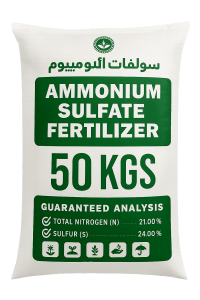Granular Ammonium Sulfate: A Widely Used Agricultural Fertilizer
Introduction:
To scientifically and academically introduce granular ammonium sulfate fertilizer, it is important to first define the term “fertilizer.” A fertilizer is a mineral, organic, or biological substance that, through its nutrient properties, enhances soil fertility or, when applied to plants, increases both the quality and quantity of crop yield. Fertilizers are generally classified into three categories:
- Chemical
- Organic
- Biological
Granular ammonium sulfate falls under the chemical fertilizer category. Some chemical fertilizers contain macro elements, which are highly consumed by plants, while others provide micro elements, which are needed in smaller quantities.
- Macro elements: Nitrogen (N), Phosphorus (P), Potassium (K), Calcium (Ca), Magnesium (Mg)
- Micro elements: Iron (Fe), Zinc (Zn), Manganese (Mn), Copper (Cu), Boron (B)
Nitrogen, as the most consumed macro element, is present in granular ammonium sulfate at 21% in the form of ammonium ions, which supplies the nitrogen needed for crops and compensates for deficiencies. Additionally, the fertilizer contains 24% sulfur in the form of sulfate, which helps regulate soil pH, reduce alkalinity, and facilitate the uptake of other micronutrients like zinc, iron, manganese, and copper. Sulfur is beneficial for crops such as canola, alfalfa, corn, potatoes, rice, vegetables, and wheat. Trees such as pistachio, citrus, and grapes, which are sensitive to urea (yellowing of leaves), benefit from ammonium sulfate. Sulfur also prevents yellowing of young leaves due to deficiency and reduces weed growth.
These two main components make ammonium sulfate an acidifying fertilizer, ideal for the predominantly alkaline and calcareous soils of Iran.
About Ammonium Sulfate:
Ammonium sulfate | (Ammonium sulfate) is an inorganic mineral salt with extensive applications in agriculture and industry. Its main use is as a nitrogen fertilizer. The fertilizer contains 21% nitrogen as ammonium ions and 24% sulfur as sulfate. It is used to reduce soil pH in alkaline soils and supply nitrogen and sulfur for plant growth, thereby improving crop quality.
Features of Ammonium Sulfate Fertilizer:
- Safer to transport and store compared to ammonium nitrate
- Adjusts pH of alkaline, saline, and calcareous soils
- Increases plant resista
- nce to drought
- Suitable alternative to urea as a nitrogen source
- Enhances phosphate absorption when used with phosphate fertilizers
- Provides readily absorbable ammonium nitrogen for plant metabolism
- Prevents yellowing and leaf drop
- Promotes leaf growth and canopy development in trees
- Improves crop quality, yield, and productivity
Ammonium sulfate is available in granular (nearly round), crystalline, and powdered forms. Granular ammonium sulfate is suitable for co-application with other solid fertilizers, and can be applied directly on soil, sprayed, dissolved in water, or mixed with other fertilizers such as urea, whereas the crystalline form is typically used as a water solution or for localized placement (banding).
Although urea contains a higher nitrogen percentage (46%) than ammonium sulfate (21%), research shows that combining granular ammonium sulfate with urea increases nitrogen use efficiency and can reduce overall urea application. This combination provides a cost-effective and efficient nitrogen fertilization strategy.
Applications of Ammonium Sulfate:
- Production of complete NPK fertilizers, potassium sulfate, ammonium phosphate
- Leather tanning (liming stage)
- Fire-extinguishing powders
- Water treatment chemicals
- Food additive for flour and bread, acidity regulation
- Pharmaceutical industry for protein purification
- Textile industry as an auxiliary in acid dyes
- Electroplating as an additive in plating baths
- Textile production for fire-resistant materials
Recommended Usage:
Fertilizer application should be based on soil tests and expert advice from agricultural engineers. Application rates, distribution methods, timing, and expected effects must all be considered.
- Farmland: 400–500 kg/ha before planting
- Orchards: 1 kg per tree in early spring
- Greenhouses: 15 g per plant
- Gardens: 25 g per square meter
Granular ammonium sulfate provides optimal nutrient supply, particularly for nitrogen and sulfur, and is highly effective for improving soil fertility and crop yield.


